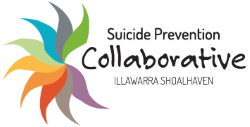How we work
Using an evidence-based approach to suicide prevention, the Collaborative aims to build a culture where, rather than working individually, people and organisations are committed to working collaboratively to create systemic change.
Our values:
Genuine collaboration – anyone is welcome to join the Collaborative, and the growing diversity of our membership echoes the need for a whole-of-community approach to suicide prevention. All contributions are respected and welcomed.
Value lived experience – central to our work is the meaningful inclusion of people with lived experience in all levels of our work. We ensure the insight and experiential wisdom of people with a lived experience of suicide is at the heaty of the development and implementation of collective suicide prevention activities across the region.
Evidence based and evidence generating practice – before undertaking any work, the Collaborative considers the evidence for what’s needed and the evidence for what will successfully address those needs. We consult the suicide prevention literature, as well as the practical wisdom of our local communities and the expertise of people with lived experience of suicide.
